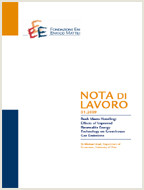Bounded Rationality and Voting Decisions Exploring a 160-Year Period

Date
30.09.2012
30.09.2012
Authors
David Stadelmann, Benno Torgler
JEL Code
D03, D72, D83, H70
D03, D72, D83, H70
Keywords:
Bounded Rationality, Voting, Referenda Attention, Rules of Thumb
Bounded Rationality, Voting, Referenda Attention, Rules of Thumb
Publisher
Economy and Society
Economy and Society
Editor
Giuseppe Sammarco
Giuseppe Sammarco
Using a natural voting experiment in Switzerland that encompasses a 160-year period (1848–2009), we investigate whether a higher level of complexity leads to increased reliance on expert knowledge. We find that when more referenda are held on the same day, constituents are more likely to refer to parliamentary recommendations in making their decisions. This finding holds true even when we narrow our focus to referenda with a relatively lower voter turnout on days on which more than one referendum was held. We also show that when constituents face a higher level of complexity, they listen to parliament rather than interest groups.
